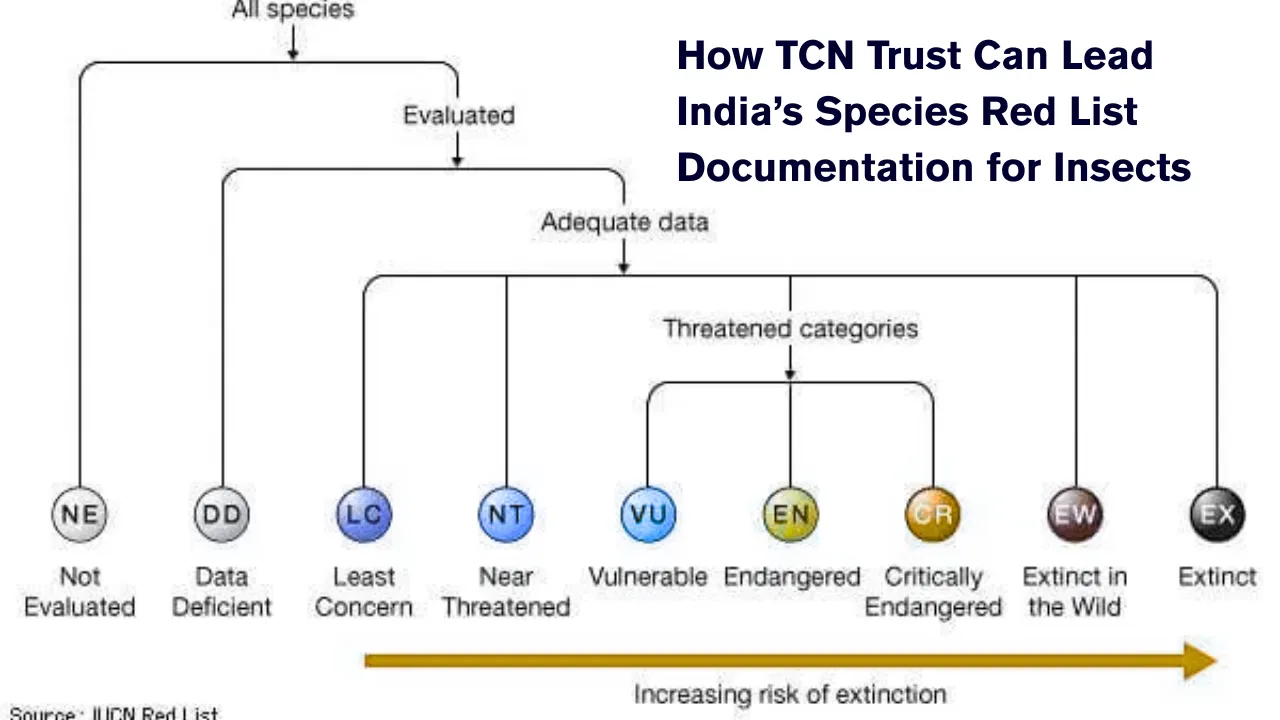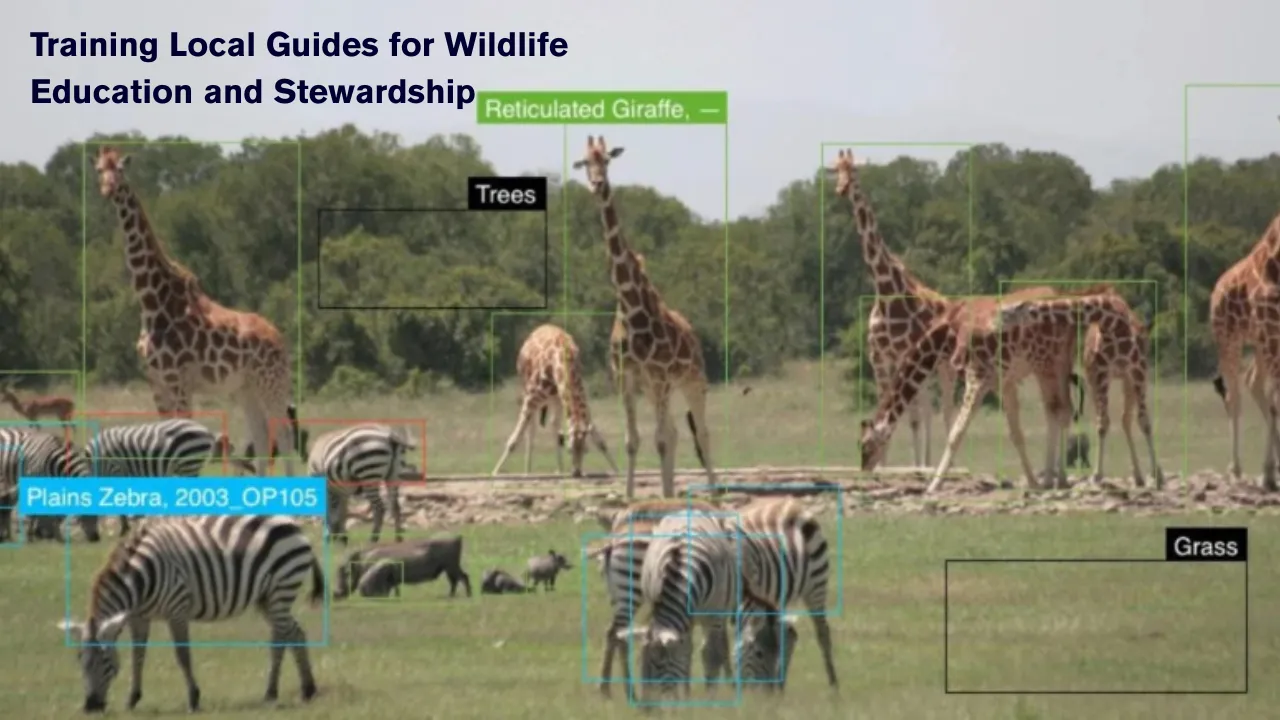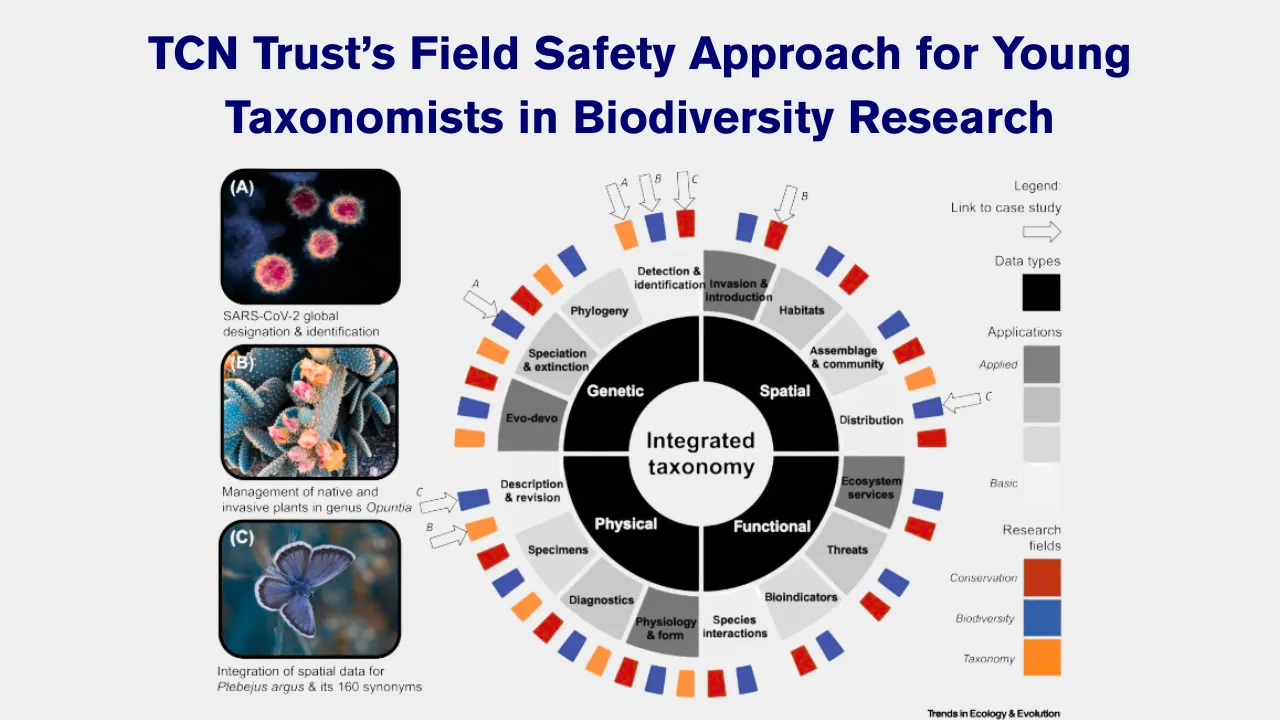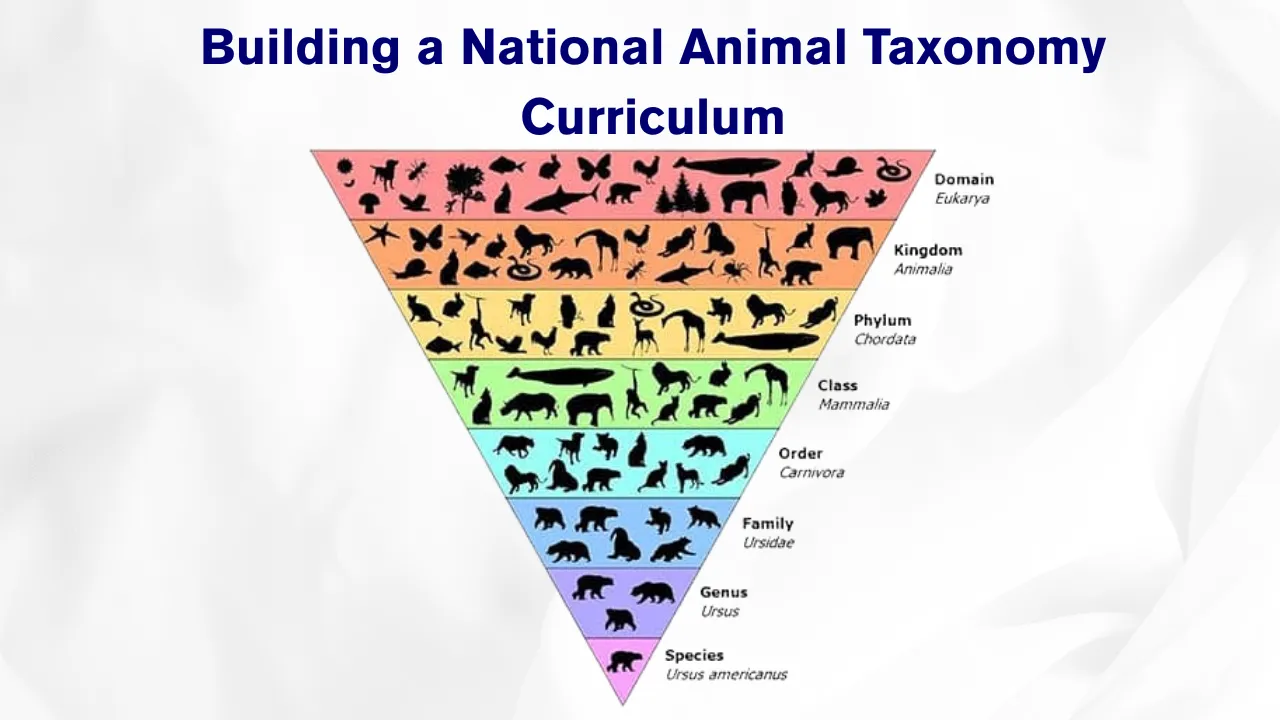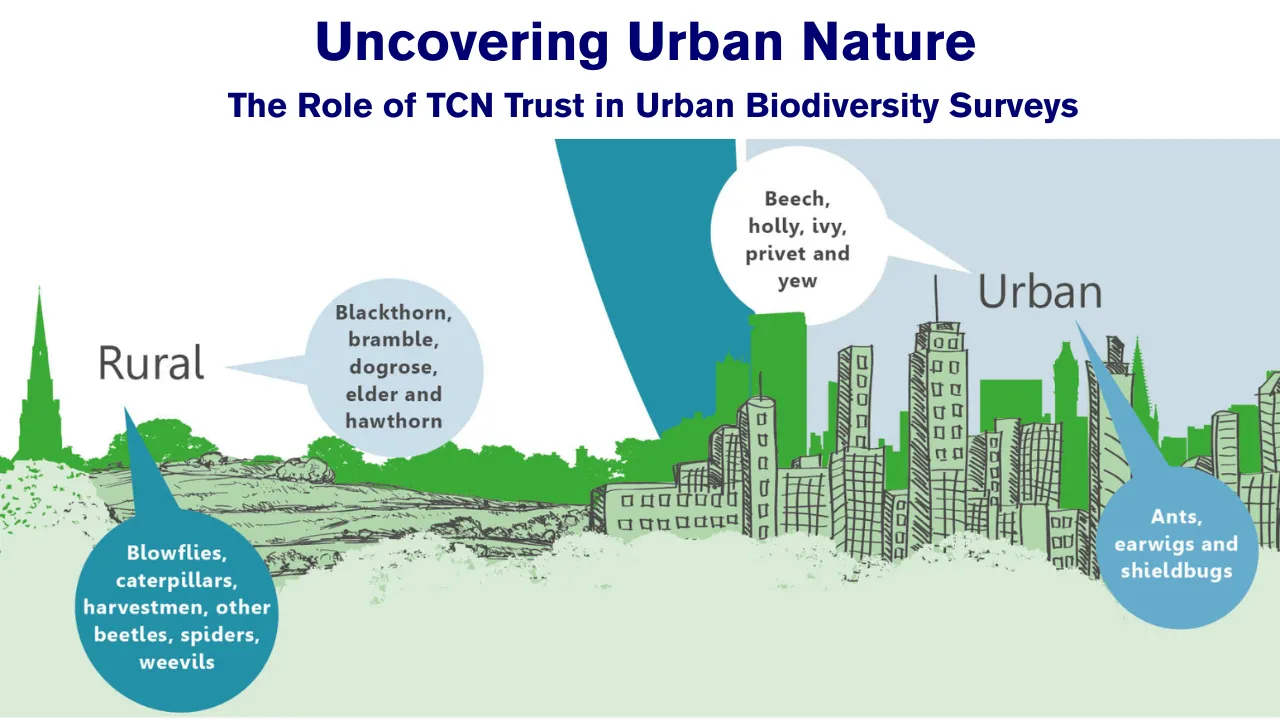Red List Documentation for Insects: Red List Documentation for Insects is one of the most overlooked yet urgently needed areas in India’s conservation framework. While vertebrates like tigers and elephants get most of the attention and funding, the invertebrate world—especially insects—remains largely undocumented and undervalued. This imbalance poses serious ecological risks, as insects form the base of many food chains and serve as key indicators of environmental health.
In this context, the TCN Trust (Taxonomy and Conservation Network) is uniquely equipped to take the lead in insect conservation. With its deep roots in taxonomy, ecological fieldwork, and community engagement, the trust holds the potential to set a national benchmark for insect-focused conservation assessments. This article explores how TCN Trust can play a pivotal role in supporting IUCN-style species risk assessments for India’s insects, particularly in underrepresented ecosystems and taxonomic groups.
Driving Conservation with Red List Documentation for Insects
The lack of formal Red List Documentation for Insects in India presents a serious gap in conservation policy. Insects make up the largest portion of biodiversity, yet their extinction risks are poorly understood. Through data-driven assessments, field surveys, and collaborative research, TCN Trust can bring visibility to threatened insect species, aligning their efforts with IUCN Red List standards. Their focus on scientific integrity, grassroots networks, and taxonomic precision makes them an ideal leader in India’s effort to map, document, and protect invertebrate life.
Overview of TCN Trust’s Red List Potential
| Area | Detail |
| Organizational Focus | Biodiversity research, taxonomy, species-level documentation |
| Core Strengths | Insect diversity, field data, ecological modeling |
| Geographic Scope | Pan-India, with focus on hotspots and unexplored habitats |
| Methodological Alignment | Structured risk assessments following IUCN protocols |
| Outreach and Education | Training researchers, citizen scientists, and young taxonomists |
Why Insect Red List Documentation Matters
India has recorded over 63,000 insect species, but conservation attention has mostly centered on charismatic megafauna. Insects play critical ecological roles in pollination, nutrient cycling, pest control, and as prey for higher animals. However, many insect populations are declining due to pesticide use, habitat destruction, climate change, and invasive species.
Without reliable assessments, species that are disappearing may go unnoticed. Red List Documentation for Insects is not just a record-keeping exercise—it’s an essential conservation strategy. It informs land use planning, habitat protection, research funding, and public policy. And yet, the lack of comprehensive insect risk data continues to limit conservation decisions on both regional and national levels.
TCN Trust’s Core Strengths
TCN Trust operates as a bridge between academic research and on-ground conservation. Unlike many institutions that focus exclusively on charismatic species or ecosystems, TCN Trust specializes in lesser-known taxa—especially invertebrates like insects.
- Specialized Taxonomy Expertise:
TCN Trust brings together trained taxonomists who focus on under-researched insect groups such as Diptera (flies), Hymenoptera (bees and wasps), and Orthoptera (grasshoppers and crickets). This depth of expertise is rare in India. - Field-Based Biodiversity Surveys:
The trust conducts field research in biodiversity hotspots and unexplored habitats, compiling region-specific data that is essential for accurate risk assessments. - Community-Based Conservation Models:
TCN partners with local communities and trains volunteers to identify, record, and monitor insect species, making the work participatory and long-lasting. - Alignment with IUCN Methodology:
By following global conservation criteria—like population trends, geographic distribution, and known threats—TCN Trust can help generate Red List-compatible profiles for insect species.
Two Major Ways TCN Trust Can Lead Red List Documentation:
- Establishing a National Insect Conservation Database
- Creating open-access platforms with species profiles
- Recording distribution, abundance, threats, and ecological roles
- Linking field observations with verified specimen records
- Creating open-access platforms with species profiles
- Developing Training Programs and Assessment Frameworks
- Educating young researchers in Red List methodology
- Hosting workshops on IUCN criteria application for insects
- Building regional hubs for risk documentation and review
- Educating young researchers in Red List methodology
Bridging the Invertebrate Knowledge Gap
Despite being megadiverse, India still lacks basic data on many insect species. Often, even known species have no information on their conservation status, let alone those that are yet to be described. TCN Trust is already working to bridge this gap by digitizing specimens, conducting taxonomic reviews, and building habitat-specific species lists.
By integrating community science with academic rigor, the trust enables a broader and more dynamic understanding of insect diversity. Their approach not only increases data availability but also encourages public interest in often-overlooked organisms.
Model Projects and Real-World Examples
TCN Trust has already begun making meaningful contributions in various parts of India:
- Moth Monitoring in the Western Ghats:
Through systematic light-trapping surveys, the trust has cataloged hundreds of moth species, some of which are potentially new to science. - Pollinator Mapping in Northeast India:
Collaborative projects with universities and local farmers have resulted in valuable data on native bee diversity and their role in agricultural landscapes. - Training Rural Youth as Biodiversity Scouts:
In the Eastern Ghats, TCN Trust is developing a cadre of local biodiversity monitors who help document insect sightings in remote regions.
These examples show how science and local knowledge can work hand-in-hand to document threatened species and build long-term conservation capacity.
Collaborations and Future Roadmap
TCN Trust understands that conservation doesn’t happen in isolation. Its ongoing partnerships with government agencies, conservation NGOs, and international experts strengthen its credibility and reach. By working with bodies like the Zoological Survey of India, Wildlife Institute of India, and IUCN South Asia, TCN can contribute standardized, high-quality data for integration into national biodiversity portals.
The next step is to establish a structured framework specifically for Red List Documentation for Insects, which could serve as a model for other developing countries. With the right funding and support, TCN Trust could lead the first national-level Red List assessments for India’s invertebrates, beginning with key indicator species in sensitive ecosystems.
FAQs
What is Red List Documentation for Insects?
It is the process of scientifically assessing the extinction risk of insect species using IUCN’s global criteria.
Why is this work important in India?
India has high insect biodiversity but lacks data on species threats. Without proper documentation, many species could vanish unnoticed.
What makes TCN Trust suitable for this work?
TCN Trust has specialized expertise in taxonomy, community outreach, and conservation assessments, making it uniquely capable of leading insect documentation efforts.
Can students or volunteers contribute?
Yes. TCN Trust runs training programs and citizen science projects to involve students, researchers, and nature enthusiasts.
How will this documentation be used?
The data can influence conservation policy, environmental planning, and even agricultural practices by identifying beneficial or threatened insect species.
Final Thought
Red List Documentation for Insects is not just a technical exercise; it’s a foundational step toward inclusive and effective conservation. TCN Trust has both the vision and the tools to lead this vital work in India. By focusing on lesser-known but ecologically critical organisms, the trust is broadening our understanding of biodiversity and making conservation more representative. At a time when the world is waking up to the crisis facing insects, TCN Trust’s commitment can place India at the forefront of global insect conservation. Supporting and scaling such initiatives is not just important—it’s essential for a truly sustainable future.
